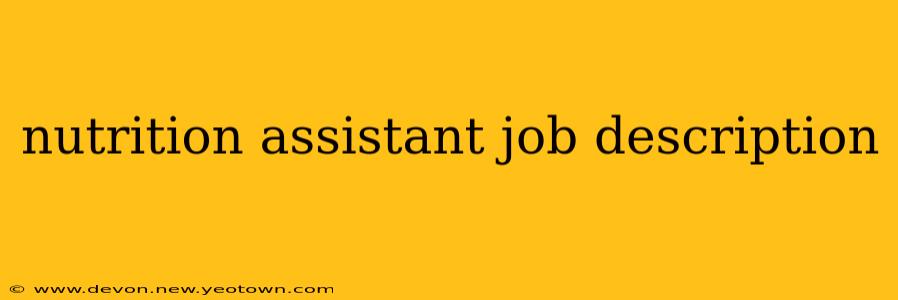The aroma of freshly baked bread, the satisfying crunch of a perfectly ripe apple, the vibrant colors of a healthy salad – these are just some of the sensory delights that might greet you each day as a Nutrition Assistant. But beyond the appealing imagery, this role plays a vital part in promoting health and well-being. It's a job that blends science, compassion, and a genuine desire to help others achieve their nutritional goals. This job description will delve into the specifics, answering common questions and painting a clearer picture of what this fulfilling career entails.
What Does a Nutrition Assistant Do?
A Nutrition Assistant works closely with Registered Dietitians (RDs) or other healthcare professionals to provide nutritional support to individuals or groups. Their responsibilities vary depending on the setting (hospital, clinic, school, or private practice), but often include:
-
Client Interaction: This could involve anything from scheduling appointments and greeting clients to collecting dietary information through interviews and questionnaires. You’ll be the friendly face that helps clients feel comfortable and confident in their nutritional journey.
-
Data Entry and Management: A significant part of the job involves meticulously recording client data, including medical history, dietary intake, and progress. This data is crucial for the RD to develop personalized plans and track their success. Accurate record-keeping is paramount.
-
Meal Planning and Preparation (Sometimes): Depending on the workplace, you may assist in developing meal plans, preparing healthy snacks, or even cooking demonstration examples. This requires knowledge of nutrition and culinary skills.
-
Educational Materials: You might be involved in creating or adapting educational materials, such as handouts, presentations, or website content, to promote healthy eating habits and nutrition education.
-
Administrative Tasks: This could include managing appointments, answering phone calls, ordering supplies, and maintaining a well-organized workspace.
What are the educational requirements for a nutrition assistant?
Many Nutrition Assistant positions require at least a high school diploma or equivalent. However, an associate's degree in nutrition, dietetics, or a related field is often preferred, significantly increasing your competitiveness in the job market. Some employers also seek candidates with experience in food service, healthcare, or customer service.
What skills are necessary to be a good nutrition assistant?
Beyond the educational qualifications, several soft skills and hard skills can boost your success as a Nutrition Assistant. These include:
-
Excellent communication skills: Building rapport with clients, explaining nutritional concepts clearly, and collaborating effectively with colleagues all rely on clear and concise communication.
-
Organizational skills: Managing appointments, data, and tasks efficiently is crucial for keeping everything running smoothly.
-
Computer proficiency: Proficiency in Microsoft Office Suite or similar software is essential for data entry and report generation.
-
Detail-oriented: Accuracy is key in recording client data and implementing meal plans. Any errors can have significant consequences.
-
Compassion and empathy: Working with clients who may be facing health challenges requires a genuine understanding of their needs and a willingness to provide support.
How much does a nutrition assistant make?
Salary expectations vary based on location, experience, and education. Researching average salaries in your specific area is essential. Entry-level positions typically offer a lower salary, with potential for increases as you gain experience and further your education.
What is the career path for a nutrition assistant?
A Nutrition Assistant role can be a stepping stone to further career advancement. With additional education and experience, you might progress to become a Registered Dietitian, a Nutrition Counselor, or pursue other related roles in the healthcare or food industries.
This is a dynamic career path offering opportunities for growth and professional development. If you are passionate about health, helping others, and possess the right skills and qualifications, the world of nutrition assistance might be the perfect place for you. It's a field where you can truly make a difference, one healthy meal, one supportive conversation, at a time.

